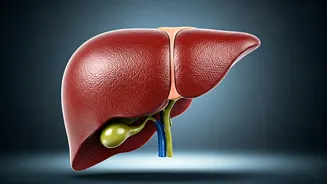Liver’s Vital Role
The liver is a powerhouse, undertaking a multitude of crucial tasks within your body. It acts as a filter, removing toxins from the bloodstream, processing
nutrients from your food, and producing essential substances like bile for digestion. Furthermore, the liver plays a critical role in metabolizing drugs and medications, ensuring their safe and effective use. Think of it as a central hub, managing various bodily functions to maintain overall health. The liver’s multifaceted roles underscore its importance, emphasizing that a healthy liver is essential for overall well-being. Neglecting liver health can lead to various complications, making it necessary to understand how to support its optimal function.
Recognizing Risks
Understanding potential threats to liver health is crucial for prevention and early intervention. Several factors can compromise the liver’s function, including excessive alcohol consumption, which can lead to alcoholic liver disease. Another common risk factor is viral hepatitis, particularly hepatitis B and C, which can cause chronic liver inflammation. Additionally, non-alcoholic fatty liver disease (NAFLD), often linked to obesity and diabetes, poses a significant threat. Certain medications, especially when taken in high doses or for prolonged periods, can also harm the liver. Recognizing these risk factors enables proactive measures, such as moderate alcohol intake, vaccination against hepatitis, adopting a healthy lifestyle, and using medications responsibly. Being aware of the risks is the first step toward safeguarding your liver.
Foods for Liver
Dietary choices significantly impact liver health, making it important to include liver-friendly foods in your diet. Foods rich in antioxidants, such as berries and leafy greens, help protect the liver from damage caused by free radicals. Including cruciferous vegetables like broccoli and cauliflower can support detoxification processes. Healthy fats found in avocados and olive oil help reduce inflammation and support liver function. Consider incorporating foods that are rich in fiber, like oats and apples, which aid in removing toxins. Reducing your intake of processed foods, saturated fats, and excess sugar is also beneficial. By making smart food choices, you can effectively provide your liver with the nutrients it needs to thrive, ensuring it functions optimally.
Foods to Avoid
Certain foods and substances can put undue stress on your liver and should be limited or avoided. Excessive alcohol consumption is a major culprit, as it can cause liver damage and increase the risk of alcoholic liver disease. Processed foods, often high in sugar, salt, and unhealthy fats, can contribute to NAFLD and other liver issues. High consumption of sugary drinks and refined carbohydrates can lead to a build-up of fat in the liver. Excessive intake of saturated and trans fats found in fried foods and red meat can also harm the liver. If you have any liver conditions, it’s also important to be cautious with certain medications and supplements, always consulting a healthcare professional before taking new medications.
Lifestyle Habits
Lifestyle choices significantly impact your liver's health, alongside dietary considerations. Regular exercise is essential, helping to maintain a healthy weight and reduce the risk of NAFLD. Staying hydrated helps the liver to function efficiently, aiding in detoxification. Limiting or abstaining from alcohol consumption is vital, protecting the liver from alcohol-related damage. Practicing safe sex and avoiding intravenous drug use reduces the risk of contracting hepatitis B and C. Regular check-ups and screenings can help catch liver problems early on. Maintaining a healthy lifestyle, coupled with good eating habits, can significantly improve your liver health, supporting its vital functions and overall well-being. Prioritizing these habits ensures a robust liver capable of efficiently performing its essential duties.
Supplements & Herbs
Some supplements and herbs are believed to support liver health, though it is crucial to approach them with caution and consult with a healthcare provider. Milk thistle is a popular supplement known for its antioxidant and anti-inflammatory properties, potentially aiding in liver cell regeneration. Artichoke extract is thought to help improve bile flow, thus supporting liver function. Turmeric, with its active compound curcumin, may possess anti-inflammatory benefits that support liver health. However, it's vital to note that supplements are not a substitute for a healthy lifestyle. Always consult a healthcare professional before starting any new supplement regimen, as some can interfere with medications or cause adverse effects. A balanced and well-informed approach ensures the safe and effective use of supplements.
Signs of Trouble
Being aware of the signs of liver problems can help you to seek timely medical attention, which can potentially prevent severe complications. Jaundice, marked by yellowing of the skin and eyes, is a significant indicator of liver dysfunction. Fatigue and weakness are common symptoms, as the liver struggles to perform its vital functions. Abdominal pain or swelling, particularly in the upper right quadrant, could also signal a problem. Changes in urine or stool color, such as dark urine or pale stools, may indicate issues. Unexplained weight loss or loss of appetite can be associated with liver disease. Any of these symptoms warrant a visit to a healthcare provider. Early detection and treatment can make a significant difference in managing liver conditions and maintaining overall health.












